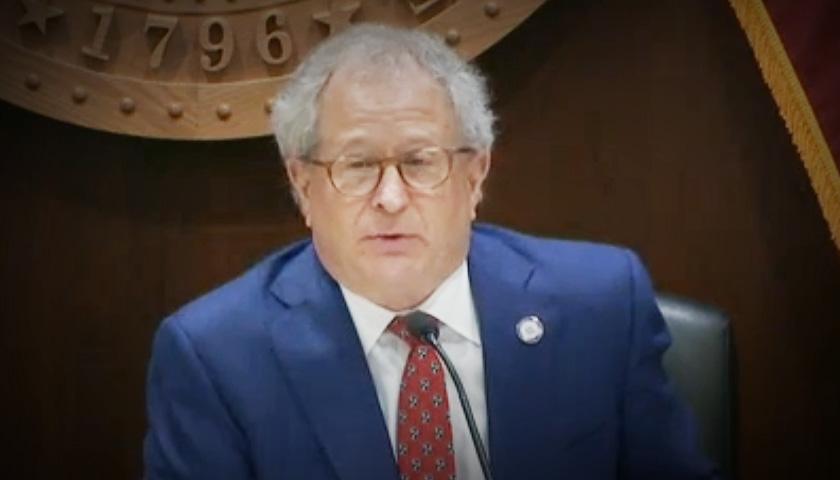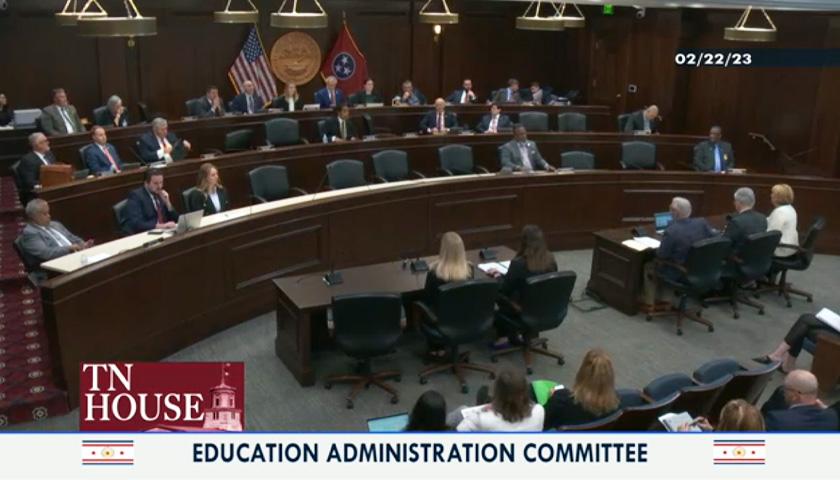Even as Tennessee’s third-grade retention law moves closer to implementation, talks on improving the law continue.
The State House Education Administration Committee held a hearing this week on the third-grade retention law. The committee provided a variety of literacy experts an opportunity to share their knowledge and experience in teaching kids to read.
In calling the proceedings to order, Chairman Representative Mark White (R-Memphis) challenged the 147 school districts across the state to ask themselves, what are they doing to prepare their students to do well in reading literacy? While acknowledging the task’s difficulty, he pointed out that”this is our job.”
 White enjoined parents to the task of spreading the burden, saying, “If you are a parent, and you are not working with your child daily, then you are missing the boat.”
White enjoined parents to the task of spreading the burden, saying, “If you are a parent, and you are not working with your child daily, then you are missing the boat.”
Invited to the hearing were six separate speakers, each given five minutes to speak, except former Mississippi Education Commissioner Carey Wright, who was provided 10 minutes. Following each speaker, White allotted eight to ten minutes for questions.
Commissioner of Education Penny Schwinn kicked off the proceedings with a short presentation that served to recap the process to date, outlining the bill’s provisions. The commissioner returned at the end of the hearing as well.
Her explanation included how targeted students could avoid retention. Among that list was a previously unmentioned element in relationship to summer school.
The law states that a student facing retention can be promoted if they “attend a learning loss bridge camp before the beginning of the upcoming school year, maintains a ninety percent (90%) attendance rate at the camp, and the student’s performance on the post-test administered to the student at the end of the learning loss bridge camp demonstrates adequate growth, as determined by the department” they can be passed on to fourth grade.
The commissioner stated, “The department has provided additional flexibility where if those students are unable to have a 90% attendance rate, those days can be made up during the 4th-grade year.”
It is unclear on what grounds Schwinn based her assertion, as it is part of neither the rules governing the law nor the law itself. No such provision is included in the FAQ provided by the Tennessee Department of Education (TDOE). Schwinn offered no further details, and in talking with local superintendents from across the state, The Tennessee Star found they have been given little additional information on this caveat as well.
Tennessee’s Literacy Act, which includes the third-grade retention law, is modeled after a Mississippi state law. Wright’s testimony provided insight into the challenges and successes experienced by Mississippi since it enacted its law. She told legislators that, in her eyes, the law was less about retention and more about supplying students with needed services.
“My goal was that, by the time third grade came around, there shouldn’t even be an issue around third-grade retention,” she told legislators. “We should have captured those kids a long time ago and made sure that they were getting the interventions and the help that they needed.”
It’s a sentiment echoed by many of Tennessee’s lawmakers, including State Representative Scott Cepicky (R – Culleoka), who told The Star, “If we are waiting until third grade to intervene, we are waiting too long.”
Gary Lilly, director of Collierville Schools in Shelby County; Jeanne Barker, director of Lenoir City Schools; and Clint Satterfield, director of schools in Trousdale County, raised district concerns in their joint presentation. Among those concerns was the use of one data post for remediation and the state’s timeline for implementation. Barker made the point that districts won’t receive TCAP results until after the school year ends, which would leave little time for retakes or parent appeals. It could also impact family decisions about attending summer learning camps.
In the closing minutes of the hearing, State Representative Gino Bulso (R-Brentwood) asked Schwinn for a follow-up on Barker’s concerns. In her response, Schwinn acknowledged that it was a “tight schedule” but concluded that it was possible due to improvements in the assessment process under her administration.
Per her shared timeline, parents would have received their first home literacy report in mid-October, with the second in January of the school year. In March, sign-ups for summer programming will begin, with priority given to students identified as needing additional support. May 15 – 26 is when results from TCAP will begin to be available.
Schwinn said this year raw scores will be available, along with raw scores to scale conversion tables, on May 19th.
Including conversion tables are new this year and will allow parents to convert their child’s score to a preliminary scale score. Allowing them to tell whether their child meets expectations or is expected to fall below expectations. The caveat here is that the pre-equating and post-equating scale scores need to match.
Based on field testing and other operational tests, the setting of the pre-equating scale scores is an estimate of how many questions kids will get right. That may or may not match up with actual scale scores after the test results from the current year are analyzed. The number of “right” answers required to reach proficiency can shift a few points either way, leaving a child initially considered “on track,” based on the provided conversion tables, only to be considered “approaching” after post-equating. Or vice versa. No explanation was offered for what would occur if those scale scores didn’t match.
May 30th to June 2nd is when parent notifications will go out. The retest opens on June 30th. Schwinn gave little clarification on what retesting would look like. Still, conversations The Star had with local superintendents indicated that it will be a repeat of TCAP administered online, without the writing portion, to provide a rapid turnaround of scores.
The parent appeals process will also open on May 30th.
Despite Metro Nashville Public Schools (MNPS) board members being present in the gallery, any input from a representative of the four major urban districts was missing from the hearing. State Representative Sam McKenzie (D-Knoxville) asked Schwinn at the end of the session, who said, “I can’t speak to the invitation list.”
When contacted by The Star via email, MNPS board member Abigail Tylor responded, “I was disappointed that none of the largest school systems in TN were allowed to speak, despite requests to do so. While I appreciated hearing what the school systems who came had to say, none of them have any priority schools in their districts, and they don’t serve high-poverty schools as a whole (the most any one system serves is 3). ”
She added, “We know this law will disproportionately affect school systems with high poverty rates who have schools on the priority list. Refusing to include school systems that will be the most affected in a ‘district perspective of the impact of implementation’ comes across as calculating. I hope large school systems will be asked to speak to the impact of the law before amendments are considered. ”
Lawmakers continue to have an open mind as more facts are presented. State Representative John Ragan (R – Oak Ridge) emailed The Star post-hearing, “A few of the minor items presented seemed to have some merit. However, I heard nothing that would justify a major change in the approach of the law under discussion.”
He added, “Nonetheless, as proposed changes are presented by my legislative colleagues, I will fully consider them on the basis of whether the accompanying supporting facts constitute necessary and sufficient premises and whether there are logical fallacies present. With this consideration in mind, and cast my vote accordingly.”
State Representative Kirk Haston (R-Lobelville) expressed satisfaction with the hearing, telling The Tennessee Star, “I think the very detailed discussion in committee highlighted the need for why we have placed such a focus on improving our student’s abilities to read. The discussion validated some of the additional promotion on-ramps that have been in the works this session that will soon be heard in the K-12 subcommittee.”
“I also thought that the meeting was beneficial in how it highlighted the current promotion of on-ramps and reading supports that are already in place,” he added. “Hopefully this was helpful for the public to better understand what we have in place now is not a process of “fail one test and get automatically retained.”
On the Senate side, Education Committee Chairman John Lundberg (R- Bristol) told The Star, “We are just watching the House to see if any changes that make sense emerge, and if they do we’ll consider them with an open mind.”
The next opportunity to gather more information comes on Tuesday at 9 a.m. when Tennessee’s assessment vendor, Pearson, is scheduled to appear before the House Education Instruction Committee.
– – –
TC Weber is a reporter at The Tennessee Star and The Star News Network. He also writes the blog Dad Gone Wild. Follow TC on Twitter. Email tips to [email protected]. He’s the proud parent of two public school children and the spouse of a public school teacher.
Photo “Tennessee Education Administration Committee” by Tennessee Education Administration Committee.






I do not trust Penny Schwinn at all. It sounds like she is bent on providing a backdoor around the law as per the caveat (not in the proposed law) she presented. Lee should have kicked her out 3 years ago Any time she is permitted to arbitrate a ruling it always goes to the liberal left and failing side of education. She is a prime example of the reasoning that has led to a failed public education system that must resort to laws such as the third grade retention law to actually get our kids the education they deserve and for which the one that we are paying.